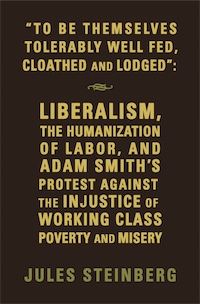| ||||||||||||
| Category: Politics |
(requires Adobe Reader)
|
| About the Book | |
|
This book is a contribution to the scholarly explanation of why Adam Smith must not be identified with the defense of a laissez-faire theory of political economy. Using Adam Smith's The Wealth of Nations as the standard by which to identify what liberalism is and is not, the author develops an argument intended to explain why liberalism and laissez-faire are antithetical, relying on his interpretation and critique of the scholarship of Ludwig von Mises, Friedrich Hayek, and Milton Friedman, each of whom inaccurately identifies liberalism with laissez-faire capitalism in order to defend free market capitalism against the Marxist position that identified capitalism with the necessity of working class poverty and misery. The radicalism of liberalism is associated with the liberal commitment to the humanization of labor and laborers, which enable Smith and liberal thinkers in general to identify liberalism with the human right of workers "to be themselves tolerably well fed, cloathed and lodged." The illiberalism of laissez-faire ideology is the result of relying on denying the right of government to promote public policies intended to establish greater equality in the distribution of wealth, using the rhetoric of laissez-faire to prevent the state from using its coercive powers to redistribute income from the rich to the poor. The laissez-faire doctrine of no government intervention in the economy is intended to protect the wealth, property and income of the rich from democratic political power and the claim that working class poverty and misery is unjust and oppressive.
|
|
| About the Author | |
 |
The author is an Emeritus Professor of Political Science at Denison University. He received his B.A. from The University of California, Berkeley, 1967, his M.A. from The University of Wisconsin, 1969, and his Ph.d from The University of Wisconsin, Madison, 1977. Dr. Steinberg is the author of three books. He currently resides in Bexley, Ohio with his wife of 56 years, Rochelle Steinberg. |

